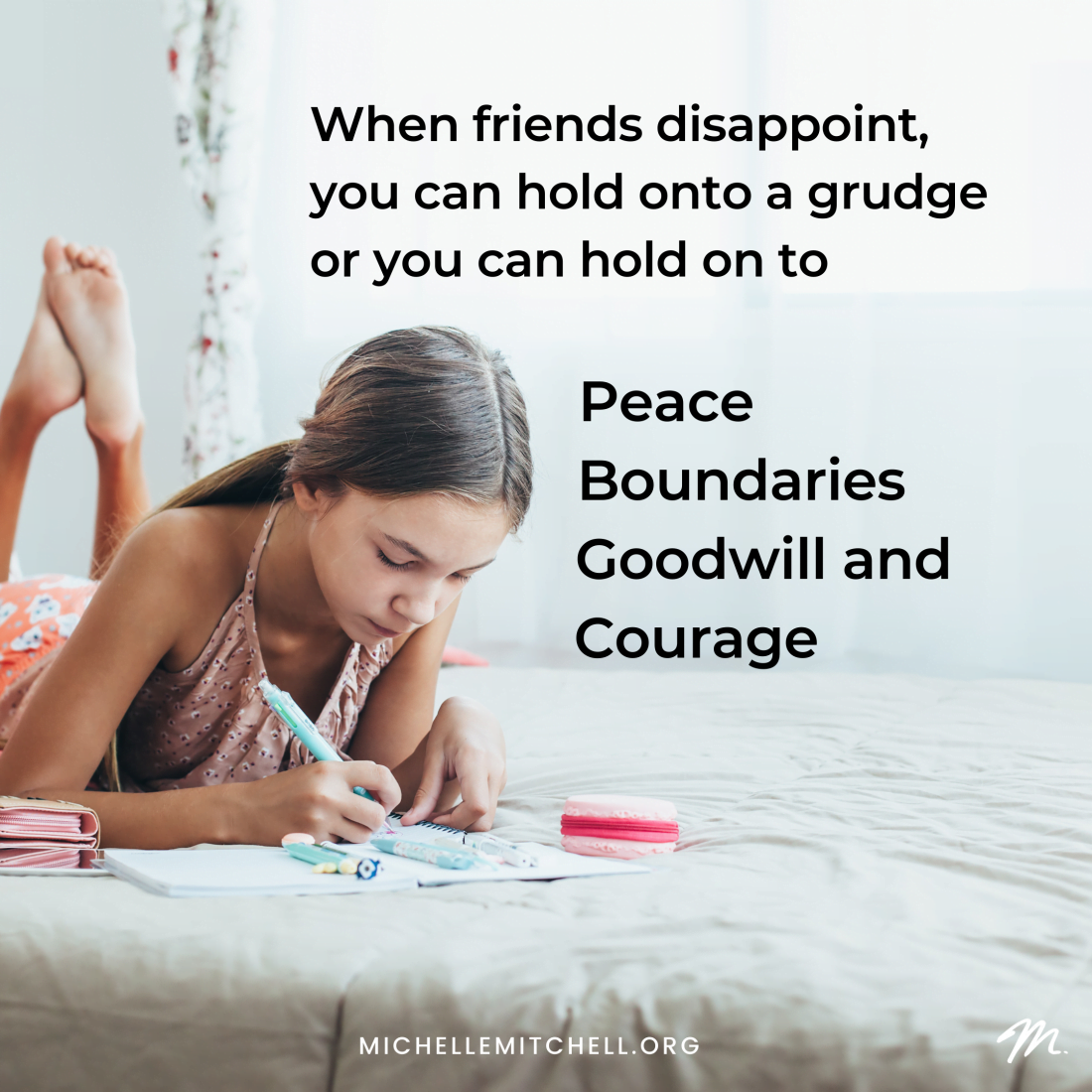michelle's blog
13-year-old Girls, Grudges and Moving On
read

This blog was written for a very special 13-year-old, struggling to make a fresh start after having a fight with a friend. I hope it helps your girl understand that navigating friendships requires a gentle balance between boundaries, grace and self-awareness — and that we can get our needs met in other ways besides holding grudges.
Dear Amy,
When I was young, I held onto my mum’s hand when I crossed the busy road outside our house. She told me that if I held her hand tightly, I would be safe. Let go and the cars might run me over! Crossing that road always felt scary, so I held on with all my might.
To this day I still look for someone (or something) to hold onto when I feel scared. It’s what we humans do. We cling ever so tightly to the things that protect us. When difficult times emerge, holding the hand of someone we trust is the surest and safest way forward.
Fear can also prompt us to hold onto other, less helpful things.
Take Emily for example. Emily had shared the name of a boy she liked with her best friend. Disappointingly, Emily’s friend shared this information with another classmate, which was horribly embarrassing. As you can imagine, Emily was scared that everyone would find out who she liked.
Over the next few weeks Emily began to hold onto feelings of resentment, anger and dislike of her once good friend. Emily eventually started spreading rumours about her friend, and spoken badly about her at every chance she got. She found it next to impossible forgive or see her friends’ efforts to repair their relationship.
People might hold grudges when:
- They want to feel powerful, and in turn, less vulnerable.
- They want to recruit support, and find safety in numbers.
- They want to create emotional (and maybe even physical) distance.
But holding a grudge comes at a cost. You knew I was going to hit you with a downside, right?
Research tells us the people who are holding grudges are more likely to withdraw, communicate poorly and feel insecure. They are less likely to enjoy their relationships. I have a feeling you already know this to be true. When you see someone at school who is carrying a hurt, they seldom feel free to enjoy relationships. They might freeze, choose not to interact, and be generally uneasy around others. They might feel stuck in their pain, unable to wipe the slate clean and start over – like Emily.
What Occupies Your Heart?
What occupies your heart and mind after someone has wronged you, will have a great impact on how you move forward. I’ve personally noticed that when I hold onto a grudge my heart and mind are FULLY occupied with negativity. Because it’s hard to hold more than one thing at a time, a grudge limits our ability to hold other more helpful things – things that improve our ability to take care of ourselves and heal from hurt.
I’ve come to think of it like this – When I forgive someone, I free my hands (and my heart) to care for myself and create boundaries that better protect me. When I hang onto hurt, I leave myself tied to the pain of an incident or a broken relationship. Think of it like an exchange – you release what is in your hand to grab something better.

Keep Holding On
These are some things I’d love you to consider ALWAYS holding onto, especially when you are afraid. If you fill your hands with these things, there won’t be as much room for holding onto a grudge. And if you have to let go of a grudge to embrace any one of these things, I promise it will be absolutely worth it.
Hold on to Your Peace
As much as depends on you, live at peace with others. That means don’t create unnecessary drama or meddle when you don’t need to. PLEASE DON’T make things more complicated than they need to be! It is our job to make it easy for people to apologise and get along with us. It’s HARD to live angry with others. (PS. Being angry can become familiar, but it’s never easy.) Keep looking for friends that like peace too! Go with the happiness flow. Look for and find people who want to live in the same flow as you do!
Hold on to Your Boundaries
One thing that is never worth letting go of (not for any amount of popularity) is your personal boundaries – which is your ability to say ‘no’ when you need to. It takes time to learn what you are okay with and what you aren’t. But once you have made these discoveries, you will be more comfortable letting go of relationships that don’t respect you.
Hold on to Your Goodwill
Unfortunately, human beings won’t ever be perfect, and they don’t always live up to our expectations. We all need to allow ‘margin for error’. Now I am not talking about allowing someone to repeatedly be deliberately unkind, dismissive, nasty or belittling. I am however talking about giving people a chance to make mistakes, and over time correct their behaviour. That’s called extending goodwill. Goodwill is something you need to keep available to people as they grow and change.
Hold on to Your Courage
Relationships come at a cost. Each time we interact with someone there is a possibility people will misunderstand, judge, reject, gossip about or dislike us. We risk being hurt. However, when you know you are strong enough to hold onto the right thing, when the wrong thing happens, everything gets much easier. Holding on positive things takes practise, but it’s possible.
RECOMMENDED READING: For more, check out Michelle’s book “Everyday Resilience: Helping Kids Handle Friendship Drama, Academic Pressure and the Self-doubt of Growing Up”.
nEW here?
If you are new to my blog, I’m guessing that someone you trust mentioned my name, or you stumbled upon me online. This site is full of helpful parenting ideas that will help you make decisions with more confidence.
If you have something specific you are looking for, why not search the topics below. If you just want to browse, why not start by reading my most popular posts.
If you would like to receive Michelle’s blog via email each month, simply sign up below, indicating if you are a parent or a professional.

top reads
- 1. Try Being 5 Minutes Late: Common Sense Ideas to Promote Resilience
- 2. How to Deal with an Entitled Teen: Strategies You Can Use Today
- 3. Choosing a Counsellor: Ideas That Could Make All the Difference
- 4. Even If: Conversations to Combat Anxiety
- 5. What to Say if Your Child is Self-Harming: A Guide to the Initial Discussion